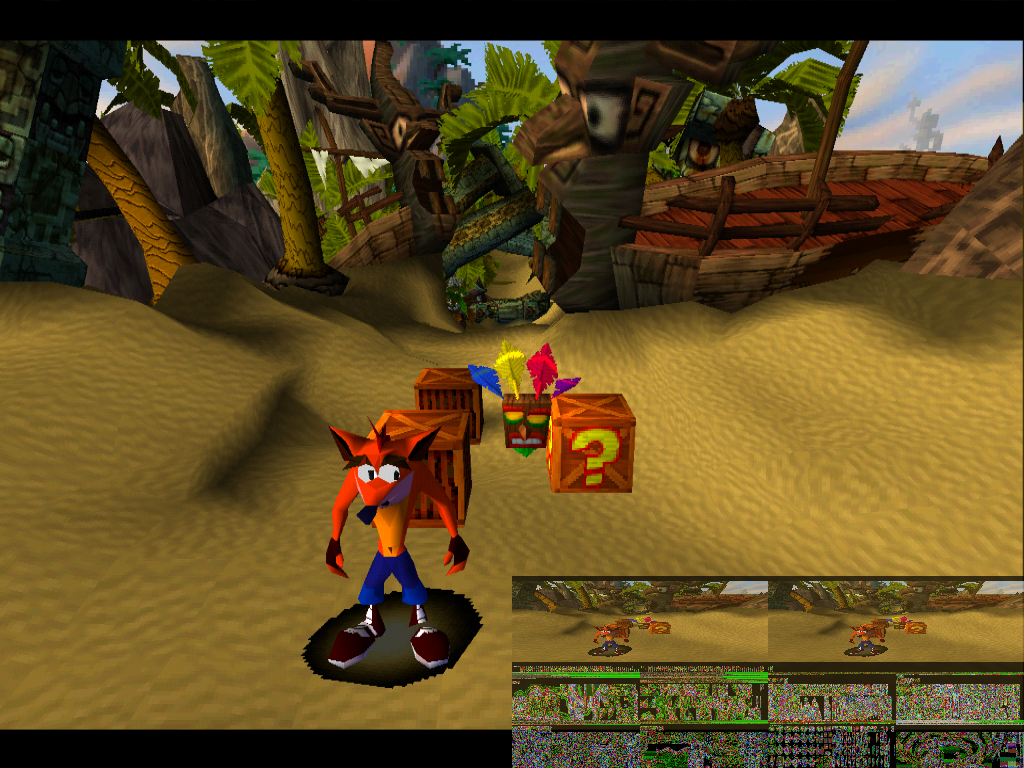https://github.com/simias/rustation
Playstation emulator in the Rust programing language
https://github.com/simias/rustation
Last synced: 9 months ago
JSON representation
Playstation emulator in the Rust programing language
- Host: GitHub
- URL: https://github.com/simias/rustation
- Owner: simias
- License: other
- Created: 2015-03-26T19:12:09.000Z (over 10 years ago)
- Default Branch: master
- Last Pushed: 2023-10-21T03:32:16.000Z (about 2 years ago)
- Last Synced: 2024-10-27T20:21:06.654Z (about 1 year ago)
- Language: Rust
- Size: 625 KB
- Stars: 555
- Watchers: 24
- Forks: 21
- Open Issues: 22
-
Metadata Files:
- Readme: README.md
- License: LICENSE
Awesome Lists containing this project
- awesome-rust - simias/rustation - ci.org/simias/rustation.svg?branch=master">](https://travis-ci.org/simias/rustation) (Applications / Emulators)
- awesome-emulators - Rustation
- awesome-emulators-android - Rustation
- awesome-rust-zh - simias/rustation - [<img src="https://api.travis-ci.org/simias/rustation.svg?branch=master">](https://travis-ci.org/simias/rustation) (应用 / 仿真器)
- awesome-rust - simias/rustation - ci.org/simias/rustation.svg?branch=master">](https://travis-ci.org/simias/rustation) (应用 Applications / 模拟器 Emulators)
- awesome-rust-cn - simias/rustation - ci.org/simias/rustation.svg?branch=master">](https://travis-ci.org/simias/rustation) (应用 / Emulators)
README
[](https://travis-ci.org/simias/rustation)
# This project is no longer being developed.
I decided to restart from scratch to fix some architectural flaws in Rustation.
Some of the code has been imported from this project, other bits have been
thoroughly rewritten. The new repository is
[rustation-ng](https://gitlab.com/flio/rustation-ng/). It's now more advanced
than this project, with proper sound support and generally more accurate
emulation.
One significant difference between the two projects is than rustation-ng dropped
the GL renderer in favor of a threaded software one. The GL renderer of
Rustation has been ported to C++ and has been integrated in the Beetle PSX
emulator however, so it's not completely dead.
# Rustation PlayStation emulator

PlayStation emulator in the Rust programing language.
This repository only contains the source code for the core of the
emulator. The OpenGL renderer and the libretro interface is is the
[rustation-libretro](https://github.com/simias/rustation-libretro)
repository.
The focus of this emulator is to write code that's clean, accurate and
hopefully easy to understand. There's no plugin infrastructure, the
emulator is monolithic.
Performance is pretty poor at the moment but it should be enough to
run close to realtime on a modern CPU.
For the time being it can only boot a few games. Crash Bandicoot
(Japanese version) is mostly playable, although I've had random
crashes. Some other games (like Spyro) freeze after or during the
intro.
If you have any questions, in particular if something in the code is
not clear or properly commented don't hesitate to fill an issue.
I also created a [/psx/ board on 8chan](https://8ch.net/psx/) if you
prefer something less formal to discuss this emulator and all things
PlayStation. We'll see if this turns out to be a good idea...
## Currently implemented (even partially)

* CPU
* Basic GTE support (ported from mednafen PSX)
* Instruction cache
* Interrupts
* Basic GPU (no semi-transparency or mask bit emulation)
* Timers (incomplete)
* DMA
* Debugger
* CDROM controller (missing many commands)
* Gamepad controller (only digital pad for now)
## Todo list
* Many things in the GPU
* MDEC
* SPU
* Memory card
* CPU pipeline emulation
* More accurate timings
* Many, many other things...
## Build
You'll need [Rust and its package manager Cargo](https://www.rust-lang.org/),
[SDL2](https://www.libsdl.org/download-2.0.php) and a PlayStation
BIOS. The emulator is mainly tested with BIOS version `SCPH1001` whose
SHA-1 is `10155d8d6e6e832d6ea66db9bc098321fb5e8ebf`.
You should then be able to build the emulator with:
```
cargo build --release
```
Don't forget the `--release` flag in order to turn optimizations
on. Without them the resulting binary will be absurdly slow.
If the build is succesful you can run the emulator using:
```
cargo run --release /path/to/SCPH1001.BIN
```
For Windows check issue [#12](https://github.com/simias/rustation/issues/12).
Use the `Escape` key to exit the emulator, `Pause/Break` to "break" into the
debugger, the emulator will then listen on TCP port `9001` for a GDB
connection.
## Debugger
In order to debug you'll need a GDB targetting
`mipsel-unknown-elf`. Once the emulator is running press the
`Pause/Break` key to trigger the debugger and then connect GDB to it
using (at the gdb command prompt):
`target remote localhost:9001`
GDB might complain about not finding symbols or the boundaries of the
current function but you can ignore that. From then you should be able
to use the familiar [GDB commands](https://sourceware.org/gdb/onlinedocs/gdb/)
to debug the live emulator.
A few examples:
```
# Dump the CPU registers
info registers
# Disassemble 20 instructions around PC
disassemble $pc-40,+80
# Display word at address 0x1f801814 (GPU status)
x/x 0x1f801814
# Add code breakpoint at address 0x00004588
break *0x00004588
# Add write watchpoint at address 0x1f801070 (IRQ ack)
watch *0x1f801070
# Step over a single instruction
stepi
# Continue until a break/watchpoint is reached (or Pause/Break is pressed)
continue
```
The debugger support is pretty experimental and quircky but it works
for basic debugging needs.
## Guide
I'm also attempting to document the emulator writing process in a
LaTeX document available in the
[psx-guide repository](https://github.com/simias/psx-guide). It's
generally lagging behind the actual code but I'll try to update it as
often as possible.
## Resources
I try to cite all of my sources in the guide above but I'm mainly
using the priceless [No$ PSX
specifications](http://problemkaputt.de/psx-spx.htm) as well as
[mednafen](http://mednafen.fobby.net/)'s source code when I feel like
cheating.
I also run tests on the real hardware and store them in the
[psx-hardware-tests repository](https://github.com/simias/psx-hardware-tests/tree/master/tests).